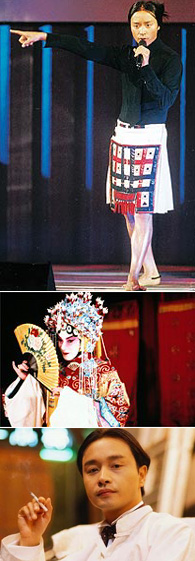Hong Kong singer-actor Leslie Cheung Kwok-wing reportedly leapt to his death from a Hong Kong hotel on Tuesday evening, HK TV stations and radio reported. The star, who is known to be gay, was 46.

Leslie Cheung performing at the Hong Kong Coliseum and as a gay opera singer in Farewell, My Concubine.
"The man was certified dead at hospital. His name is Cheung 'X' Wing and was aged 46. He left a suicide letter," the police spokeswoman said, declining to give details. A suicide note was found on the body, the police spokeswoman added.
He was certified dead at 7:06 pm (1106 GMT) after arriving at Queen Mary Hospital.
Hong Kong's Cable TV reported that Cheung had left a note saying he was suffering from emotional problems before his death. There were also reports that Cheung began "behaving abnormally" since last year after he starred in a horror film, Inner Senses, which was to be the last of his 60 films. In other reports, Cheung was said to have split or encountering problems with his long-time partner, known as Mr Tong. He had, however, consistently denied the reports.
Cheung is one of the very few Asian stars to have discussed his sexuality.
In 2000, Cheung said in a Time magazine interview that he is bisexual, having had relationships with women although in recent years, he was often photographed with his long-time boyfriend, Mr Tong.
"It's more appropriate to say I'm bisexual," Cheung said in the interview. "I've had girlfriends. When I was 22 or so, I asked my girlfriend Teresa Mo (his frequent co-star in TVB serials of the time) to marry me."
Born in the youngest of 10 children to a famous tailor in Hong Kong on Sept 12, 1956, he was sent to school in Norfolk, England when he was 12.

Leslie Cheung performing at the Hong Kong Coliseum and as a gay opera singer in Farewell, My Concubine.
Cheung became one of Chinese-speaking Asia's most popular singers in 1981 with the success of his album The Wind Blows On. In 1986, his film career gained momentum when he played a rookie cop alongside movie icon Chow Yunfat in director John Woo's gangster movie A Better Tomorrow.
In 1990, Cheung immigrated to Canada but only to return later to begin what was to be a very successful film career playing openly gay characters.
Cheung earned international acclaim and recognition for his performance as a gay opera star specialising in female roles in Chen Kaige's 1993 landmark historical drama Farewell, My Concubine, which scooped a series of awards, including the prestigious Palme d'Or at the Cannes Film Festival as well as two Academy Award nominations.
In 1997, Cheung starred in perhaps the most daring role of his career as the bitchy Ho Po-wing, one of a pair of gay Chinese lovers stranded in Buenos Aires in Wong Kar Wai's Happy Together opposite Tony Leung. The film's explicit sex scenes made it of the most controversial movies of the year and one of the most acclaimed - winning the Best Cinematography award at the 1997 Golden Horse Award at Taipei and Best Director award at the 1997 Cannes Film Festival.
He is also remembered for playing a heterosexual composer coming to terms with his gay feelings in a fluffy box-office hit, He's a Woman, She's a Man. In the film, he falls in love with his young protégé whom he eventually resolves to love regardless of gender; as he sings in a song composed for "him": "Whether you are a boy or girl - it doesn't matter. I only know that I love you."
